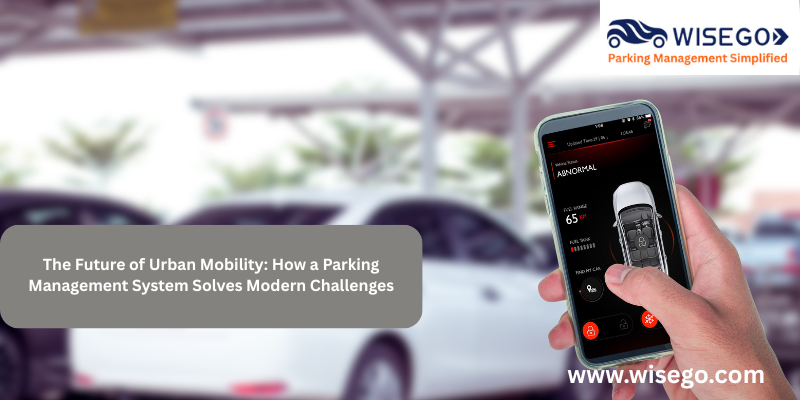Notifications

7 minutes, 51 seconds
-12 Views 0 Comments 0 Likes 0 Reviews

In the age of smart cities and digital transformation, the way we manage urban mobility is undergoing a massive overhaul. One of the most pressing and often overlooked aspects of urban planning is parking. Traffic congestion, environmental pollution, and inefficient use of land are just a few of the problems associated with outdated parking methods. Enter the Parking Management System—a modern solution that is revolutionizing the way we think about and interact with parking infrastructure.
A Parking Management System is an integrated solution designed to streamline and automate parking operations. This system can manage both on-street and off-street parking spaces using software, hardware, and real-time data analytics. From parking access control to payment processing and spot availability tracking, this technology offers a comprehensive approach to solving urban parking woes.
A well-implemented Parking Management System can improve traffic flow, reduce carbon emissions, optimize land usage, and enhance user satisfaction. These systems are used in shopping malls, airports, universities, hospitals, and increasingly, entire cities.
The rapid urbanization of cities has led to a dramatic increase in the number of vehicles on the road. With limited space and growing demand, cities are facing severe parking challenges. A Parking Management System offers several key benefits:
Traditional parking methods often result in underutilized or poorly managed spaces. A smart Parking Management System can monitor real-time occupancy and direct drivers to the nearest available spot. This not only maximizes space utilization but also reduces the time spent searching for parking.
One of the leading causes of traffic in urban areas is drivers circling blocks in search of a parking spot. By guiding drivers using sensors and digital signage, a Parking Management System reduces this unnecessary circulation, easing congestion and improving traffic flow.
Less time spent searching for parking means lower emissions. By reducing idle time and optimizing traffic patterns, a Parking Management System contributes to cleaner air and a more sustainable environment.
Modern systems provide users with mobile apps and digital interfaces that allow them to reserve spots, make payments, and receive real-time updates. This level of convenience improves customer satisfaction and loyalty, particularly in commercial zones.
For municipalities and private lot owners, a Parking Management System provides detailed analytics and reporting. This data can be used to adjust pricing, monitor usage, and identify trends—ultimately maximizing revenue.
A fully functional Parking Management System consists of several integrated components. These include:
Sensors and Cameras: Used to detect vehicle presence and license plate numbers.
Automated Barriers and Gates: Manage access control efficiently.
Mobile Apps and Kiosks: Provide an interface for users to interact with the system.
Software Platforms: Analyze data and provide dashboards for operators and administrators.
Payment Solutions: Include contactless payment methods, credit card integration, and mobile wallets.
Smart parking is an advanced version of the Parking Management System that uses IoT (Internet of Things), AI, and machine learning technologies. These systems can predict peak hours, suggest alternate routes, and even communicate with autonomous vehicles. Cities like San Francisco, Singapore, and Amsterdam are already leveraging smart parking systems to manage their growing mobility needs.
With 5G connectivity and edge computing, future Parking Management Systems will be able to deliver real-time updates with almost no latency, ensuring even more efficient operations.
The versatility of a Parking Management System makes it suitable for a variety of environments:
Commercial Complexes: Shopping malls, business districts, and entertainment venues.
Airports and Transport Hubs: To manage long-term and short-term parking efficiently.
Residential Communities: Controlled access for residents and guests.
Hospitals and Universities: Managing multiple user categories with varying access levels.
Municipalities: Managing public spaces to reduce illegal parking and improve road safety.
When selecting or implementing a Parking Management System, it’s crucial to evaluate certain key features:
Real-time Monitoring
Cloud-based Access
Data Analytics
Scalability
User-friendly Interfaces
Multi-payment Options
Integration with City Infrastructure
A reliable system should also include robust cybersecurity features to protect sensitive user and financial data.
While the advantages are numerous, deploying a Parking Management System is not without its challenges. These include:
High Initial Investment: Costs associated with hardware, software, and installation.
Maintenance Requirements: Regular servicing is essential for uninterrupted functionality.
Resistance to Change: Users and operators may need time to adapt to new systems.
Integration Issues: Ensuring the system works seamlessly with existing infrastructure.
Despite these hurdles, the long-term benefits far outweigh the initial difficulties. With proper planning and execution, the ROI of a Parking Management System is substantial.
Artificial Intelligence is making Parking Management Systems smarter than ever. AI algorithms can predict parking demand based on historical data, weather, and local events. Machine learning models continuously improve accuracy and efficiency, reducing human intervention and error.
Voice-assisted parking apps, automated license plate recognition, and predictive availability are just a few innovations powered by AI.
The growing complexities of urban living demand smarter solutions. A Parking Management System is no longer a luxury but a necessity for cities and businesses aiming to offer seamless mobility and high-quality service. By leveraging cutting-edge technology, these systems not only resolve traditional parking issues but also pave the way for a smarter, cleaner, and more efficient urban future.
Whether you're a city planner, property manager, or business owner, investing in a modern Parking Management System is a step toward better mobility, enhanced user satisfaction, and sustainable urban development.

